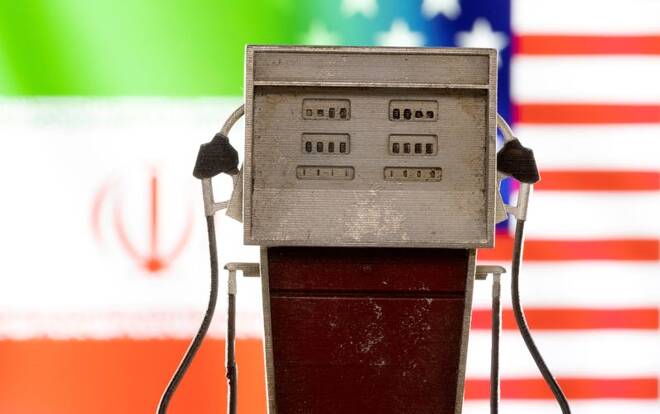Advertisement
Advertisement
U.S. pressures Iran by targeting Chinese, UAE companies
By:
WASHINGTON (Reuters) - The United States on Thursday imposed sanctions on Chinese and Emirati companies and a network of Iranian firms that help export Iran's petrochemicals, a step likely aimed at raising pressure on Tehran to revive the 2015 Iran nuclear deal.
By Arshad Mohammed and Daphne Psaledakis
WASHINGTON (Reuters) -The United States imposed sanctions on Thursday on Chinese and Emirati companies and on a network of Iranian firms that help export Iran’s petrochemicals, a step that may raise pressure on Tehran to revive the 2015 Iran nuclear deal.
The U.S. Treasury department said it had imposed penalties on two companies based in Hong Kong, three in Iran, and four in the United Arab Emirates, as well as on Chinese citizen Jinfeng Gao and Indian national Mohammed Shaheed Ruknooddin Bhore.
“The United States is pursuing the path of meaningful diplomacy to achieve a mutual return to compliance with the Joint Comprehensive Plan of Action,” Under Secretary of the Treasury for Terrorism and Financial Intelligence Brian Nelson said in a statement, referring to the 2015 nuclear agreement.
Under the pact, Iran limited its nuclear program to make it harder for Tehran to obtain a nuclear weapon in exchange for relief from U.S., European Union and United Nations sanctions that had choked Iran’s oil-dependent economy.
Then-U.S. President Donald Trump pulled out of the deal in 2018 and restored U.S. sanctions, prompting Iran to start violating the nuclear restrictions about a year later. Talks to revive the agreement have so far failed.
“Absent a deal, we will continue to use our sanctions authorities to limit exports of petroleum, petroleum products, and petrochemical products from Iran,” Nelson said.
In Tehran, Iran’s deputy foreign minister for economic diplomacy dismissed the new sanctions as ineffective.
“Our petrochemical industry and its products have long been under sanctions, but our sales have continued through various channels and shall continue to do so,” Mehdi Safari told Iranian state TV.
Henry Rome, deputy head of research at the Eurasia Group, said the sanctions may aim both to raise pressure on Iran and to blunt U.S. domestic critics who argue that U.S. President Joe Biden has failed to rein in Iran’s nuclear program.
“Washington is likely aiming to raise the costs for Iran of a continued no-deal scenario while also deflecting domestic and foreign criticism that it is allowing its Iran policy to drift,” Rome said, saying that any single sanctions action was unlikely to change thinking in Iran or China absent a broader strategy.
“Indeed, Tehran may calculate that given the state of the oil market and global inflationary pressures, a concerted (U.S.) campaign to collapse Iranian energy exports to Trump-era levels is not in the cards in the near term,” Rome added.
The nuclear pact seemed near revival in March but talks unravelled partly over whether Washington might drop the Islamic Revolutionary Guard Corps, which controls armed and intelligence forces that Washington accuses of a global terrorist campaign, from the U.S. Foreign Terrorist Organization list.
The Treasury Department named the Hong Kong-based companies as Keen Well International Ltd and Teamford Enterprises Ltd and the Iran-based firms as Fanavaran Petrochemical Company, Kharg Petrochemical Company Ltd and Marun Petrochemical Company.
The two Hong Kong-based companies and Gao could not be immediately reached for comment.
Kharg could not be reached for comment late on Thursday, the weekend in Iran, while Fanavaran and Marun did not immediately reply to emails seeking comment.
The Treasury listed the four UAE-based companies as Future Gate Fuel and Petrochemical Trading L.L.C., GX Shipping FZE, Sky Zone Trading FZE and Youchem General Trading FZE. Reuters could not obtain contact information for them to seek comment.
All property and interests in property of the firms falling under U.S. jurisdiction are blocked and those who deal with them may also be sanctioned or penalized under some circumstances.
(Reporting by Arshad Mohammed in Saint Paul, Minn. and by Daphne Psaledakis in Washington; Additional reporting by Doina Chiacu, Michael Martina and Kanishka Singh in Washington and by Ghaida Ghantous, Andrew Mills and Dubai Newsroom, Hong Kong and Beijing Newsroom; Editing by Paul Grant, Daniel Wallis and Raju Gopalakrishnan)
About the Author
Reuterscontributor
Reuters, the news and media division of Thomson Reuters, is the world’s largest international multimedia news provider reaching more than one billion people every day. Reuters provides trusted business, financial, national, and international news to professionals via Thomson Reuters desktops, the world's media organizations, and directly to consumers at Reuters.com and via Reuters TV. Learn more about Thomson Reuters products:
Advertisement
